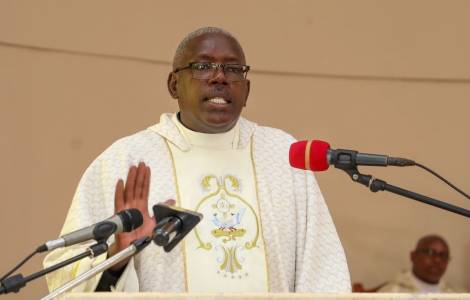
Nairobi (Agenzia Fides) - Today, November 16, Peter Kimani Ndung'u, appointed Bishop of Embu on August 15 (see Fides 15/8/2024), will receive episcopal ordination in his diocese and thus take up his episcopal office.
Bishop Kimani, who was chaplain of Kenyan prisons for 20 years, speaks to Fides about his experience.
Can you describe your work in prisons?
Of my almost 25 years as a priest, I have worked as a prison chaplain for 20 years. I began my service in prisons in January 2001. During all this time I have been able to observe the changes in terms of the reform of the prison system, the living conditions of prisoners (food, medical care, hygiene, the possibility of training, religious freedom, etc.) and the change in staff. These are positive changes, a general improvement in the living conditions of prisoners. Until 2000, Kenyan prisons were almost death chambers. Before that, every prisoner was simply considered a convict serving his sentence. But now prisons have become rehabilitation centers for people who have committed crimes. Special facilities have been created within prisons to assist in the rehabilitation of prisoners through psychological counseling and vocational training programs.
Of course, prison chaplains are involved and actively participate in this process by preaching the Gospel and introducing prisoners who wish to do so to the faith and lay movements. Organizations such as the Catholic Men's Association, the Catholic Youth Federation and several catechists are active in the prisons. There are also a total of 25 Catholic chaplains working full-time in the prisons.
A beautiful sign of hope not only for prisoners but for all of Kenya...
There are so many signs of hope in Kenya compared to other countries. I have seen the faith of those convicted grow. There is not a high recidivism rate among those who have served their sentence. Very few of them return to prison. This is partly due to the psychological support and partly due to the spiritual support they have received during their imprisonment.
What are the most common crimes?
They are committed by the most serious community crimes. They can be violent, violent or raped, sexual violence, even terrorism. They come from the areas of the country. In the poorest areas, violent and small crimes are common. In the cities, people find themselves caught in violent or disordered rapes. In short, there are no crimes that predominate over the others.
Are there any particular events that have impressed you the most during your service in the prisons?
One of the most moving stories was that of a prisoner sentenced to death who told me the day before his appeal hearing: "Tomorrow I will go to court and ask for mercy, but before that I want to confess. During confession he told me: "Father, I will ask for mercy, not forgiveness, because if I ask for forgiveness I will not be forgiven. But if I ask for mercy I will be free." The next day, this man went to court and asked the judge for mercy and was released after 20 years in prison. For me it was almost a miracle because I was impressed by this man's faith in the mercy of God and man.
Is there cooperation between the different faiths in prisons?
The prison system respects the different faiths. The four main faiths in Kenya are represented. There are Muslim imams who take care of prisoners of the Islamic faith, several pastors from Protestant communities who take care of their believers, Catholic chaplains and, more recently, representatives of the Seventh-day Adventists. They all work closely together in mutual respect for each other's faith for the benefit of all prisoners. We take care not only of the prisoners, but also of the staff in the prisons, starting with the prison guards, because we are all part of the same family. (L.M.) (Agenzia Fides, 16/11/2024)